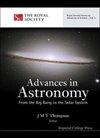磁盘集成月球亮度温度介于89和190 GHz之间
IF 1.2
4区 物理与天体物理
Q3 ASTRONOMY & ASTROPHYSICS
引用次数: 8
摘要
在相对满月-80°至50°的相位角下,测量了月球在89、157、183和190 GHz的盘面综合亮度温度。它们是用NOAA-18上的微波湿度探测器(MHS)从月球出现在仪器深空视图中的39个实例中获得的。将多项式拟合到测量值,并确定其出现的最高温度和相位角。将这些结果与Keihm、Mo和Kigawa以及Yang等人的三个不同模型的预测或更确切地说是参数表达式的预测进行比较,发现在MHS测量中,较低频率的相位滞后明显较大。由于月球已经在所有微波探测器的视野中出现了数千次,这项调查证明了气象卫星微调模型的潜力,并将月球作为极其准确的校准参考。本文章由计算机程序翻译,如有差异,请以英文原文为准。
Disk-Integrated Lunar Brightness Temperatures between 89 and 190 GHz
Measurements of the disk-integrated brightness temperature of the Moon at 89, 157, 183, and 190 GHz are presented for phase angles between -80° and 50° relative to full Moon. They were obtained with the Microwave Humidity Sounder (MHS) on NOAA-18 from 39 instances when the Moon appeared in the deep space view of the instrument. Polynomials were fitted to the measured values and the maximum temperature and the phase angle of its occurrence were determined. A comparison of these results with the predictions from three different models or rather parametrical expressions by Keihm, Mo & Kigawa, and Yang et al. revealed significantly larger phase lags for the lower frequencies in the measurements with MHS. As the Moon has appeared thousands of times in the field of view of all microwave sounders combined, this investigation demonstrates the potential of weather satellites for fine tuning models and establishing the Moon as extremely accurate calibration reference.
求助全文
通过发布文献求助,成功后即可免费获取论文全文。
去求助
来源期刊

Advances in Astronomy
ASTRONOMY & ASTROPHYSICS-
CiteScore
2.70
自引率
7.10%
发文量
10
审稿时长
22 weeks
期刊介绍:
Advances in Astronomy publishes articles in all areas of astronomy, astrophysics, and cosmology. The journal accepts both observational and theoretical investigations into celestial objects and the wider universe, as well as the reports of new methods and instrumentation for their study.
 求助内容:
求助内容: 应助结果提醒方式:
应助结果提醒方式:


